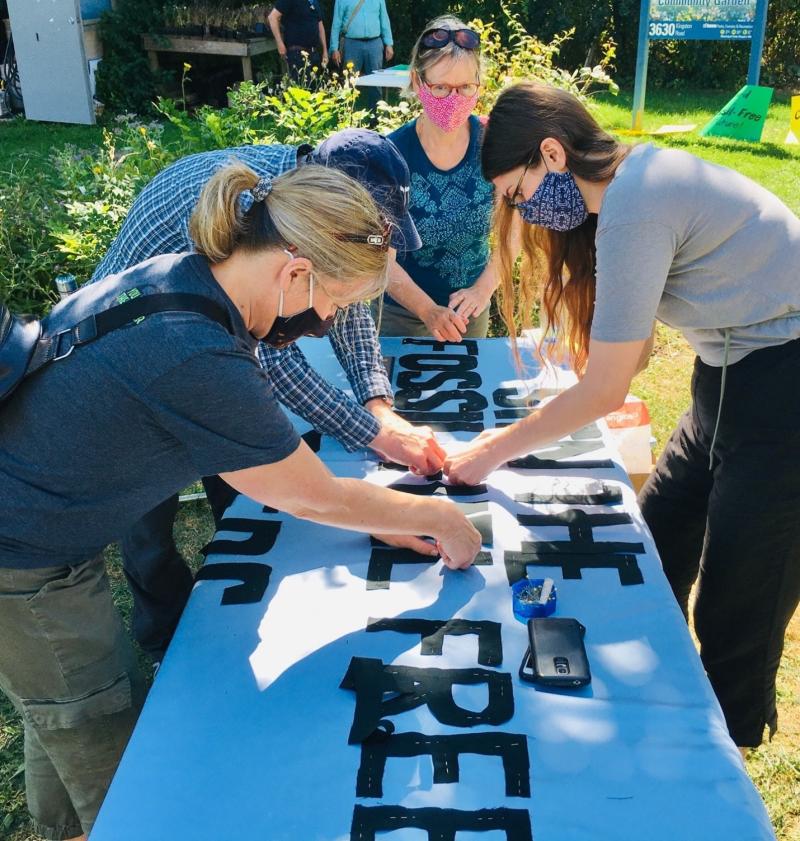
“One of the best and most challenging things about the climate crisis is that there is no one solution. That is, the solution is a mosaic of many changes.”
- Rebecca Solnit
 Most likely you are here because you are concerned about the health of the planet and what life will be like for future generations.
Most likely you are here because you are concerned about the health of the planet and what life will be like for future generations.
You are not alone.
Millions of Canadians, and millions more around the world, are worried about the environment and the consequences of pollution and global warming. Given that everyone will be affected by the impacts of climate change, it can be surprising and frustrating that our political and economic/business leaders are not doing more to protect us from the projected loss of biodiversity, water & food insecurity, property damage & loss, premature death from heat related illnesses and increases in disease.
Many of us have already realized that we can no longer wait around hoping that someone else is going to solve the climate crisis. We are demanding, but not waiting for, politicians to pass and enforce the legislation required. We are pushing, but not expecting, corporations to use their money, ingenuity and entrepreneurial skills to forge new fossil fuel free pathways forward. We have realized that to stave off the worst of these impacts we must use our collective resources and voices to create the changes and actions we so urgently need. That together we can create the pressure required to get action by politicians and change by corporations. We'll use all the methods needed to make that difference whether it is action on the street, or divestment, or lobbying, or letters to the editor.
And we would love for you to join us.
How to Take Action!
Each and every action we take either as individuals or a collective can make a difference. And there are plenty of ways to do that within your capacity, area of interest and comfort zone.
1. START WHERE YOU ARE
While we need wide sweeping systemic change, our individual habits including consumption and transportation will be critical in highlighting society's desire for a cleaner, healthier and more equitable future. Here is a list of individual actions you might be able to build into your day!
- Eat more plants and less animal products. Ideally you could find locally sourced, in season foods as well!
- Get moving! Use active & public transportation for trips 5K or less.
- Stop idling. If you are going to use a personal combustion engine automobile, please cut your engine if you are stopped for more than 60 seconds. Not only does idling cost you money in wasted fuel & component wear, fossil-fuel burning engines emit loads of poisonous gases that contribute to climate change and devastating cardiovascular problems. While you may not notice the fumes from inside your car, children and pets are close to the level of an exhaust pipe and bear the brunt of a running engine. For more information please visit this site.
- Buy less stuff - especially online. As David Suzuki says, “Our hyper consumption is a huge cost to the planet.”
- Follow the 6 R’s - Reduce, Reuse, Repair, Repurpose, Rot (compost) and if all these options are exhausted: Recycle. Only 9% of global plastic waste is recycled. So always try to buy food, clothes and household items with little to no packaging.
- Put on a sweater before turning up the heat. And consider looking around your home for ways to make it more efficient and less reliant on fossil fuels. Installing a heat pump for heating & cooling in your home, turning down your hot water temp by a degree or two, switching to induction and adding more insulation can safe you money and offset their expense in a few years.
- Bring your own containers and shop at bulk stores. It’s amazing how much less household garbage you incur when you buy at waste free stores. They seem to be popping up everywhere these days! Try to always carry a reusable coffee cup. The waste being incurred by single use items is half of all plastic waste. 95% of plastic street litter in Toronto is disposable food and beverage packaging.
- Watch what you wear! The fashion industry is the second largest polluter in the world just after the oil industry. Especially avoid fast fashion as it’s the second most water-intensive industry in the world. Fast fashion also impacts garment workers who work in unhealthy, dangerous conditions with sometimes very low wages. If you are going to buy new clothes buy well made, natural fiber clothes which will last and hopefully not end up in the landfill. Also look into consignment and vintage stores, renting clothes and borrowing!
If you want to do a deep dive into creating a green and sustainable lifestyle, check out this page: https://davidsuzuki.org/take-action/act-at-home/
The list of actions we can take goes on is endless. You don’t have to make huge changes to make a difference; and you certainly don’t need to suffer because of them! Our lives can become richer. Conscious and thoughtful buying, reaching out to neighbors to borrow items, participating in clothing swaps with friends, getting to know your local farmers, taking mending and clothing repair classes. All these things promote community and relationships. Exactly what the world needs right now. Coming together is what will save the planet and enrich our lives!
If you are interested in learning more about how you can reduce your personal carbon footprint, visit: https://www.carbonfootprint.com/calculator.aspx
2. TALK ABOUT IT
One of the best ways we can take action is also the simplest: talk about it! Talking to your friends, family, and colleagues about the crisis helps to inform people about the problems and solutions from someone they trust. Hearing from you may help influence their future behavior and add to the effort of getting that proverbial rock up the hill.
Climate conversations do not need to be heavy, science-based lectures. They can be woven into most things you already are talking about (i.e.,“Too bad we couldn’t go skating with the kids much this winter”)! You can also introduce a climate crisis themed book to your book club (“Let’s read Ducks!”). The key is to “meet people where they’re at” and to try to help connect the dots between what they care about and climate change.
If you would like help getting a climate conversations there are a number of programs available that have been developed:
- ClimateFast’s Kitchen Table Conversation
- For Our Kids’ School Yard Climate Conversations
- Carbon Conversations
- Project Neutral: Talk Climate To Me
- The Week
3. GET (&STAY) INFORMED
If you are new to the climate action world, you may want to spend a bit of time getting familiar with (some of!) the science, issues and solutions surrounding the crisis. Please don’t get bogged down by too many of the details. It is easy to become overwhelmed - climate change really is an everything issue! We recommend finding an area that you really care about (health, kids, economy, etc) and spend your energy on that.
Here are a few places you can go to keep on top of it all:
- Climate Atlas: https://climateatlas.ca/climate-change-basics
- The Energy Mix: https://www.theenergymix.com/
- The Guardian: https://www.theguardian.com/environment/climate-crisis
- Covering Climate: https://coveringclimatenow.org/
- The Lancet Planetary Health: https://www.thelancet.com/journals/lanplh/home
- NASAs Climate Kids: https://climatekids.nasa.gov/
- Al Gore’s TEDTalk “What the Fossil Fuel Industry Doesn’t Want You Know”
- The Washington Post’s Climate Conversations
- Corporate Knights: https://www.corporateknights.com/climate/
- Just Have a Think: https://www.youtube.com/@JustHaveaThink
Of course ClimateFast is always here to support you in becoming an effective advocate for the future! Consider signing up to our newsletter for lots of great information delivered to your inbox once a month!
4. JOIN OR SUPPORT A CLIMATE GROUP
To create the change we need there is a lot of heavy lifting to be done. While this sometimes seems like pushing a square rock up a steep mountain we must not be overwhelmed. People have been helping each other push that rock for generations and there are millions of us ready to mobilize and keep the work going. And the more people that join the movement, the lighter the work becomes. There is room and a great need for everyone at climate groups across the globe. From the biggest major charities, to the smallest community grassroots group - you will find a place.
If you would like to join a group below are just a few groups that you may be interested in learning more about:
- ClimateFast
- For Our Kids
- 350 Canada
- Grandmothers Act to Save the Planet (GASP)
- Seniors for Climate Action Now
- Citizens’ Climate Lobby
- Ontario Climate Emergency Campaign
- Fridays for Future Canada
- Regen- Toronto (formerly Project Drawdown)
- Environmental Defence
- David Suzuki Foundation
- Greenpeace Canada
If you are unsure about what group would best suit you, please contact us and we will try and help you out!
5. GET POLITICAL
Calling, writing and meeting your elected officials at all levels of government is one of the most important things any of us can do. We need to constantly and consistently let representatives know that we need meaningful, and funded, climate action. Even if your local representative is climate forward, keep calling and supporting them. It helps them to keep climate/environmental high on the agenda if they have a list of constituents demanding action.
Deputations are also incredibly impactful. When the opportunity arises, submitting a written or oral submission to support projects and budgets that will help mitigation and adaptation efforts is critical. Governments need to hear from the public during decision making periods. While they may seem intimidating, deputations are wide ranging: from simple statements of opinion to professionally researched and cited submissions. ClimateFast offers free deputation training at least once a year. For examples of deputations, check out our youtube channel.
There are so many ways we can all be making a difference; so many ways we can help create a better future for the generations to come. Each moment has the potential to create an enormous wave of collective action. But we must start now:
Later is too late.
